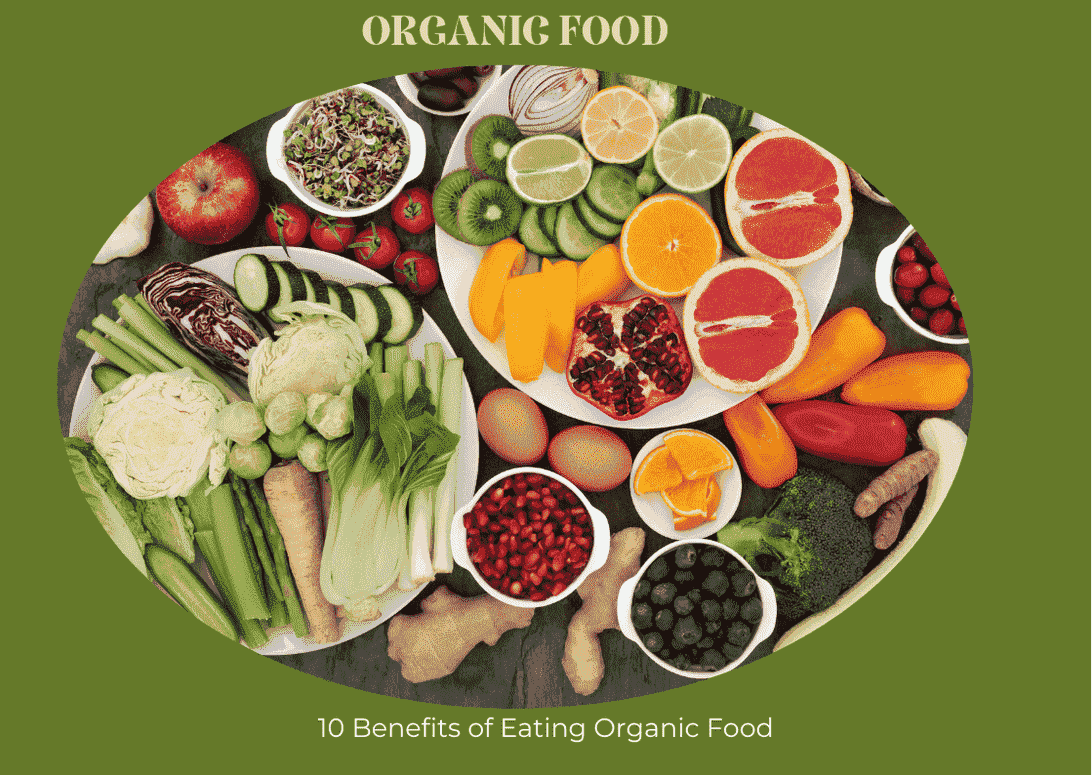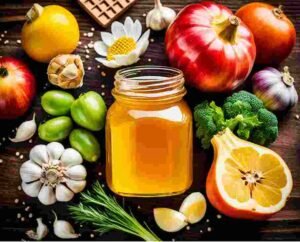In recent times, the popularity of organic food has soared, with more people opting for organic produce over conventionally grown counterparts. But what exactly makes organic food so appealing?
Let’s delve into the10 Benefits of Eating Organic Food
Table of Contents
Reduced Exposure to Pesticides:
Organic farming practices prohibit the use of synthetic pesticides and fertilizers, minimizing the risk of ingesting harmful chemicals commonly found in conventionally grown produce.
Nutrient Density:
Studies suggest that organic fruits and vegetables may contain higher levels of certain nutrients, such as antioxidants, vitamins, and minerals, due to healthier soil conditions and cultivation practices.
Support for Local Farmers:
Choosing organic foods often means supporting local farmers who prioritize sustainable agriculture methods, fostering a stronger connection to the community, and promoting environmental stewardship.
Environmental Conservation:
Organic farming techniques prioritize soil health, water conservation, and biodiversity, reducing pollution and preserving ecosystems for future generations.
Enhanced Flavor and Quality:
Many enthusiasts of organic food claim that it tastes better and has superior quality compared to conventionally produced food, attributing this to the absence of artificial additives and genetic modifications.
GMO-Free Assurance:
Organic certification standards prohibit the use of genetically modified organisms (GMO,s), providing consumers with assurance that their food is free from genetically engineered ingredients.
Animal Welfare:
Organic animal products, such as meat, dairy, and eggs, come from animals raised in more humane conditions, with access to outdoor areas and a diet free from antibiotics and growth hormones.
Reduced Antibiotic Resistance:
By avoiding the routine use of antibiotics in animal agriculture, organic farming helps mitigate the spread of antibiotic-resistant bacteria, safeguarding both human and animal health.
Lower Environmental Impact:
Organic farming practices prioritize renewable resources and conservation, leading to reduced carbon emissions, water pollution, and soil degradation compared to conventional agriculture.
Long-Term Health Benefits:
While more research is needed, some studies suggest that a diet rich in organic foods may contribute to lower rates of certain diseases, including cancer, cardiovascular disease, and obesity, though individual results may vary.
Here are some examples benefit of organic foods along with details about their benefits:

Organic Fruits and Vegetables:
Benefits: Organic fruits and vegetables are grown without synthetic pesticides and fertilizers, which can reduce the risk of pesticide residues in food and minimize environmental impact. They often have higher levels of antioxidants, vitamins, and minerals due to healthier soil conditions and organic farming practices.
2. Organic Dairy Products:
Benefits: Organic dairy products come from animals that are raised without the use of antibiotics or synthetic hormones. This means that consumers can enjoy milk, cheese, yogurt, and other dairy products with the assurance that they are free from harmful additives and produced in more humane conditions.
Organic Eggs:
Benefits: Organic eggs are laid by chickens that have access to outdoor areas and are fed an organic diet free from GMOs, and synthetic pesticides. They are often higher in omega-3 fatty acids and vitamin D compared to conventional eggs, and consumers can feel good knowing that the hens are treated more humanely
Organic Meat and Poultry:
Benefits: Organic meat and poultry come from animals that are raised without the use of antibiotics, growth hormones, or GMO feed. This means that consumers can enjoy meat products that are free from potentially harmful additives and produced in more sustainable and ethical ways.
Organic Grains and Legumes:
Benefits: Organic grains and legumes are grown without synthetic pesticides or fertilizers, which can result in higher nutrient content and better soil health. Choosing organic options like quinoa, rice, lentils, and beans supports sustainable agriculture practices and reduces environmental impact.
Organic Herbs and Spices:
Benefits: Organic herbs and spices are grown without synthetic pesticides, herbicides, or irradiation, preserving their natural flavors and nutritional benefits. Using organic herbs and spices in cooking ensures that consumers are not exposed to harmful chemicals and supports sustainable farming practices.
Organic Nuts and Seeds:
Benefits: Organic nuts and seeds are grown without synthetic pesticides or fertilizers, making them a healthier choice for both consumers and the environment. They are rich in essential nutrients like protein, healthy fats, vitamins, and minerals, and choosing organic options supports sustainable agriculture practices.
Organic Beverages (Coffee, Tea, Juices):
Benefits: Organic beverages like coffee, tea, and juices are produced without synthetic pesticides or fertilizers, preserving the natural flavors and health benefits of the ingredients. Choosing organic options supports sustainable farming practices and ensures that consumers are not exposed to harmful chemicals.
you can also check the benefits of using organic soap in the following link
By choosing organic options in these categories, consumers can enjoy food and beverages that are not only healthier and safer but also produced in ways that are more sustainable and environmentally friendly.
In conclusion, the decision to incorporate organic food into your diet offers numerous benefits, ranging from personal health advantages to environmental sustainability and support for local communities. By making informed choices about the foods we consume, we can positively impact our well-being and the world around us.




